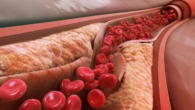
11 Unexpected Allergy Symptoms You Can't Ignore
0
Warning signs can be headaches , constipation and even circles under the eyes.
Allergy is the most common chronic disease in Europe. From 10 to 40% of the world's population suffer from one or another form of this disease, and by 2025 the number of sufferers may increase to 50%.
There is a stereotype that allergies are easy to recognize. Watery eyes, runny nose, rashes are indeed the most common symptoms. But there are others. No less revealing.
We have collected symptoms that may indicate that you have a chronic allergic reaction. Even if you are not ready to count yourself among those with allergies.
1. Headache
A headache can have dozens of causes. It is possible to assume that the head still splits due to allergies, based on the nature of the unpleasant sensations. There are two options:
- The pain is localized in the area of the sinuses and radiates to the bridge of the nose.
- The pain is unilateral (touches only the left or right side of the head), throbbing. It can be aggravated by bright sunlight and accompanied by nausea.
If such attacks are repeated regularly, you can contact a therapist or an allergist directly. This can be a clear symptom of pollinosis.
2. Constipation
Constipation is one of the most common signs of food allergy. This is especially evident in young children.
A study involving almost 9,500 children under the age of three found that 73% of children who had problems with constipation were later found to be allergic to cow's milk protein.
In adults, the connection between constipation and food allergy is not so unambiguous. Nevertheless, it is assumed that it is. If you regularly experience difficulties with defecation, perhaps your body is suffering from some allergen in your diet.
3. Constant feeling of fatigue
Allergy to plant pollen, dust, wool of domestic animals is accompanied by swelling in the nasal passages. Due to edema, even if it is slight and almost imperceptible, the supply of oxygen to the lungs and the supply of organs and tissues to them may deteriorate. But that's not all.
Due to difficulties with nasal breathing, a person cannot sleep. He often wakes up during the night and wakes up in the morning not feeling rested. Day after day, fatigue accumulates. And this is clear evidence for a visit to a therapist.
4. Memory disorders
Given the constant lack of sleep, problems with concentration and memory are completely predictable.
5. Chapped lips
The habit of breathing through the mouth leads to the fact that the lips are weathered, dry and cracked. Cracks on the lips are often not the first symptom that doctors notice in allergy sufferers who have just come for their first “thematic” appointment.
6. Abdominal pain
According to the Cleveland Clinic, regular mild stomach cramps are a relatively common symptom of food allergy that is often ignored.
The cause of the pain is histamines produced in the gastrointestinal tract in response to contact with the allergen.
p>
7. Dark circles under the eyes
Allergic swelling in the sinuses leads to stagnation of blood in the small capillaries under the eyes. Blood vessels expand, darken and become visible under the thinnest skin around the eyes.
8. Loss of smell
If allergy-related nasal congestion is not treated (for example, by not noticing it and getting used to mouth breathing), it can lead to deterioration or even loss of smell – anosmia.
9. Decreased taste sensitivity
The ability to receive taste sensations is closely related to the sense of smell. If you have a problem with the sense of smell, then the taste is dulled. Food begins to seem fresh, “nothing”.
You can notice a decrease in taste sensitivity by indirect signs. For example, you started reaching for salt and pepper shakers more often than before to enhance the taste of dishes.
10. Hoarse voice
With severe allergies, the vocal tract is compressed. This can lead to a hoarse voice. If the hoarseness does not go away within 7-10 days, a visit to the therapist is mandatory.
A sign of allergy can also be an intrusive dry cough for no reason, which you cannot get rid of.
Anaphylactic shock – a severe form of allergic reaction – is sometimes similar to a panic attack. If you regularly experience panic attacks and don't understand what's causing it, pay attention to your surroundings.
What did you just eat? What do you breathe? Did they put on latex gloves? Or maybe you took some medicine? Panic can be the body's response to a meeting with an allergen that is dangerous for you personally. And it should be installed.
If you think you have an allergy, contact a therapist and tell him in detail about the symptoms that seem suspicious to you. The doctor will conduct an examination, ask you about your lifestyle, diet, and bad habits. Most likely, he will offer to pass a number of tests to rule out other diseases.
If the assumption of a hidden allergy seems justified to the therapist, you will receive a referral to a narrower specialist – an allergist. And already under his guidance, you will take tests for allergens to find the substance that causes your body to overreact.









Leave a Reply